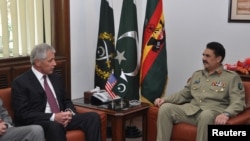ISLAMABAD, PAKISTAN —
U.S. Secretary of Defense Chuck Hagel visited Pakistan on Monday where he held talks with civilian and military leaders over bilateral security cooperation and efforts to establish peace in neighboring Afghanistan. The controversy over U.S. drone strikes against militants in Pakistani tribal areas also was discussed.
Hagel's trip was the first visit to Pakistan by a Pentagon chief in nearly four years. It came at a time when U.S.-led international forces are reducing their presence in neighboring Afghanistan.
Hagel met with Prime Minister Nawaz Sharif and the country’s new military chief, General Raheel Sharif.
According to the Pentagon, the talks provided what it said was "an opportunity to advance a broad, robust, and continuous United States-Pakistan dialogue on topics of shared concern, including security and stability in the region."
The Pakistan prime minister’s office said in a statement that Sharif conveyed Pakistan’s “deep concern” over continuing U.S. drone strikes and stressed that they are counterproductive to his government’s anti-terrorism efforts.
The U.S. drone program has triggered anti-American protests in Pakistan. The Pentagon says the strikes are aimed at terrorists who are attempting to undermine U.S. troops in nearby Afghanistan.
Former Pakistani ambassador to Washington Ashraf Jehangir Qazi said diplomatic and street protests are unlikely to cause the United States to end drone strikes.
“If you want to preserve your territory from such attacks, then you simply have to extend your writ throughout your country and particularly over areas from where attacks are being launched into Afghanistan inflicting casualties on American and Afghan forces. That has to be done. Only then will you see the drones come down. Whether that is the best way or not but that is the most effective way of seeing it happening,” said Qazi.
The U.S. armed drones are mainly targeting suspected militants in Pakistan’s semi-autonomous North Waziristan tribal region where fugitive insurgents linked to the Haqqani network have established sanctuaries.
The opposition party of former cricket star Imran Khan is leading anti-drone protests. Activists have blocked the supply route in Khyber Pakhtunkhwa province and have vowed to do so until the U.S. drones are stopped.
The U.S. last week halted the shipments due to what it called "security concerns." Sharif's government, however, is opposed to forcefully interrupting NATO cargo through Pakistan. It has cautioned protesters the move could lead to the country’s international isolation.
Hagel on Monday told Pakistani leaders that if they do not resolve protests halting the shipments, it could be difficult to maintain political support in Washington for an ongoing aid program for the country.
Defense officials say Sharif told them that Pakistan would address the issue.
Hagel's trip was the first visit to Pakistan by a Pentagon chief in nearly four years. It came at a time when U.S.-led international forces are reducing their presence in neighboring Afghanistan.
Hagel met with Prime Minister Nawaz Sharif and the country’s new military chief, General Raheel Sharif.
According to the Pentagon, the talks provided what it said was "an opportunity to advance a broad, robust, and continuous United States-Pakistan dialogue on topics of shared concern, including security and stability in the region."
The Pakistan prime minister’s office said in a statement that Sharif conveyed Pakistan’s “deep concern” over continuing U.S. drone strikes and stressed that they are counterproductive to his government’s anti-terrorism efforts.
The U.S. drone program has triggered anti-American protests in Pakistan. The Pentagon says the strikes are aimed at terrorists who are attempting to undermine U.S. troops in nearby Afghanistan.
Former Pakistani ambassador to Washington Ashraf Jehangir Qazi said diplomatic and street protests are unlikely to cause the United States to end drone strikes.
“If you want to preserve your territory from such attacks, then you simply have to extend your writ throughout your country and particularly over areas from where attacks are being launched into Afghanistan inflicting casualties on American and Afghan forces. That has to be done. Only then will you see the drones come down. Whether that is the best way or not but that is the most effective way of seeing it happening,” said Qazi.
The U.S. armed drones are mainly targeting suspected militants in Pakistan’s semi-autonomous North Waziristan tribal region where fugitive insurgents linked to the Haqqani network have established sanctuaries.
The opposition party of former cricket star Imran Khan is leading anti-drone protests. Activists have blocked the supply route in Khyber Pakhtunkhwa province and have vowed to do so until the U.S. drones are stopped.
The U.S. last week halted the shipments due to what it called "security concerns." Sharif's government, however, is opposed to forcefully interrupting NATO cargo through Pakistan. It has cautioned protesters the move could lead to the country’s international isolation.
Hagel on Monday told Pakistani leaders that if they do not resolve protests halting the shipments, it could be difficult to maintain political support in Washington for an ongoing aid program for the country.
Defense officials say Sharif told them that Pakistan would address the issue.




